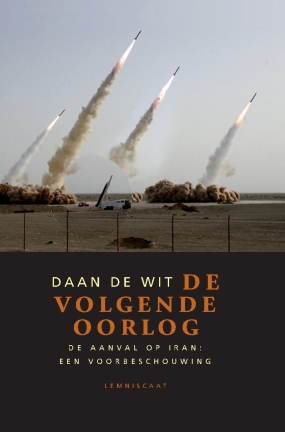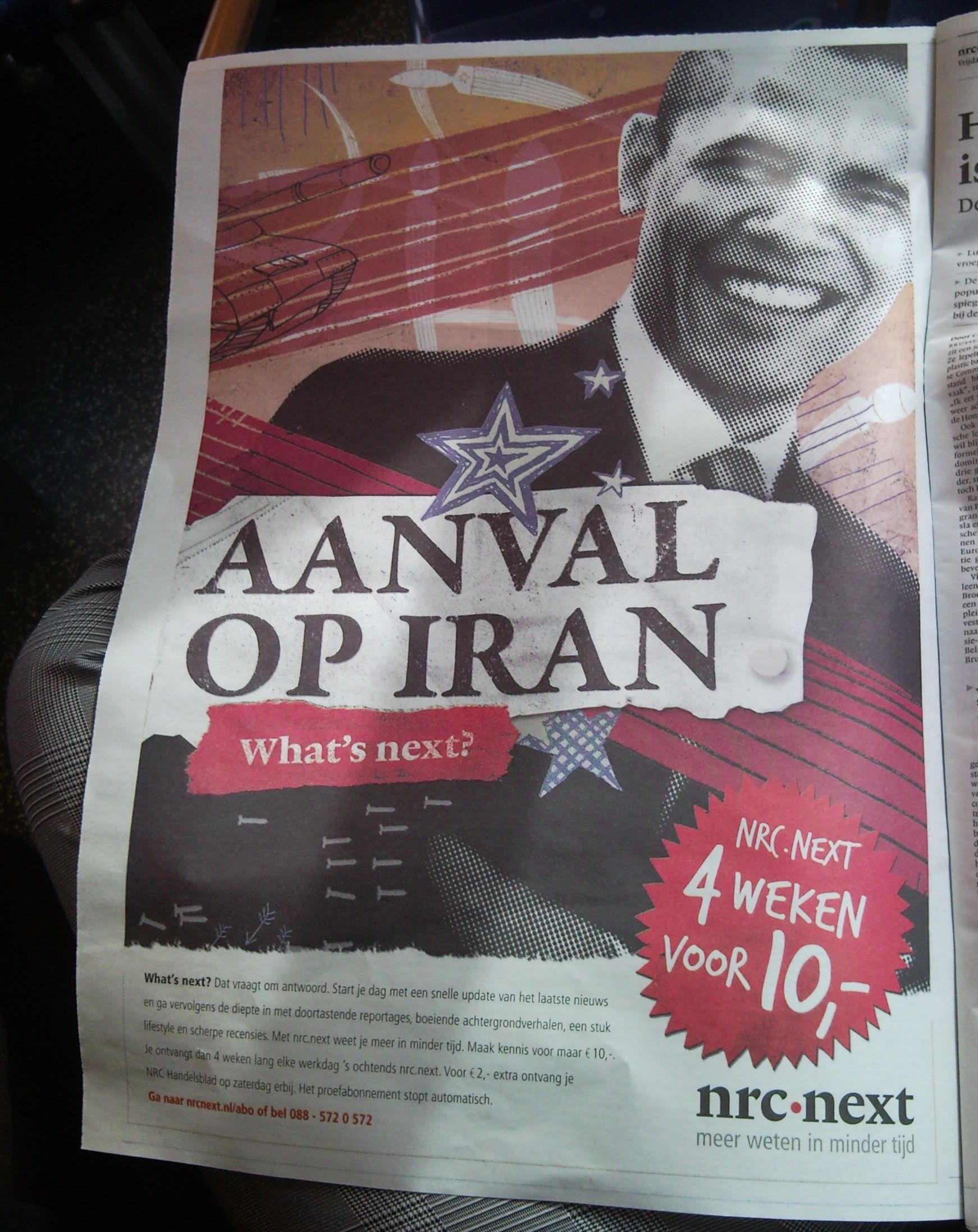
|
NEDERLANDS | ENGLISH
|
|
|
25 maart 2009
|
 mail dit artikel
| mail dit artikel
|
 print
| print
|  
Dit artikel is deel van de serie: De komende oorlog tegen Iran
[ 1 - 2 - 3 - 4 - 5 - 6 - 7 - 8 - 9 - 10 - 11 - 12 - 13 - 14 - 15 - 16 - 17 - 18 - 19 - 20 - 21 - 22 - 23 - 24 - 25 - 26 - 27 - 28 - 29 - 30 - 31 - 32 - 33 - 34 - 35 - 36 - 37 - 38 - 39 - 40 - 41 - 42 - 43 - 44 - 45 ]
The Next War: Donkerdoorn vs Daan de Wit (1)
By Donkerdoorn
This interview was translated by Ben Kearney. In his book “The Next War“, independent journalist Daan de Wit explores the gradual American buildup towards a conflict with Iran under the administration of Bush II. Following the invasions of Afghanistan and Iraq, a possible third American war in the Middle East. De Wit sees striking parallels  between the run-up to the war in Iraq in 2003 and the current, threatening situation involving the ambitious Shiite power. Working on the basis of hundreds of reports, analyses and commentaries, he takes note of American aspirations and the desire for war, and comes to the conclusion that it came very close to the Bush Administration carrying out its plans. Now we have President Obama, the man of hope and change. Bush and his neocons are gone, so is the coast clear for Tehran? We put the question to De Wit. On Obama, Iran, Israel and the still explosive situation in the Middle East. between the run-up to the war in Iraq in 2003 and the current, threatening situation involving the ambitious Shiite power. Working on the basis of hundreds of reports, analyses and commentaries, he takes note of American aspirations and the desire for war, and comes to the conclusion that it came very close to the Bush Administration carrying out its plans. Now we have President Obama, the man of hope and change. Bush and his neocons are gone, so is the coast clear for Tehran? We put the question to De Wit. On Obama, Iran, Israel and the still explosive situation in the Middle East. DD: Daan, we now have Obama - the man of change - in Washington. Bush is gone, and with him goes the American threat to Iran. Or so you'd think. We're still hearing that trusty "Bush rhetoric" out of Washington. Iran is a direct threat to Israel, a nuclear Iran is unacceptable to the world community. We're once again seeing reports turning up in the media on the amount of uranium that Iran allegedly possesses for a bomb. On the other hand Obama seems to be holding to his word and wants to enter into direct diplomatic contact with Iran. Obama even reached out his hand in a video message aimed at Iranians. Are we dealing with schizophrenic American policy here? How do you explain this American position? America has enough problems already. The country is looking into the abyss and isn't looking for a new military adventure in the Middle East. Reluctant generals started putting the brakes on the Iran project during the waning days of the Bush Administration, and the credit crisis is doing the rest. We know that since September of 2008 it's on top of the agenda and never left since. As of the beginning of March 2009 Iran has started getting back in the news. More recently through the video message from Obama. DD: The video message from Obama - a sincere reaching-out or a tactical move? What's striking about the opening that Obama appears to be creating is that it's more form than content. But form is important, because that's essential for Iran. Iran wants to be looked at as an equal partner, and has been continually frustrated in this. So a message from the American president with his So upon further inspection the beauty of Obama's gesture is perhaps not so nice. The Iranians know that without a nuclear program they will never be able to achieve the position they want in the region. Because of this they have no wiggle room. At the same time America seems to be declaring an unwillingness to move toward the Iranian position. Iran cannot be be allowed to become a nuclear state. If an unyielding Iran is unable to consider the gesture of the unyielding Obama, then later on the American president can always say that he did everything he could to reach out to the Iranians. Everyone saw him reach out, and sympathy for the reluctant "fist" of Iran, as Obama put it earlier, won't be very great. Another important player in the game surrounding Iran is Israel. Haarzetz writes: ‘Just a few hours after Obama’s message was broadcast, President Shimon Peres sent a similar message from Israel to the people of Iran, in which he harshly attacked President Mahmoud Ahmadinejad for denying the Holocaust, called on the people of Iran to topple their leaders and promised that Israel would survive. The contrast between the two messages - one from Washington and one from Jerusalem - says much about the different approaches taken by Israel and the United States regarding Iran: While the Americans are actively seeking a way to start a dialogue, Israel is preaching confrontation and the toppling of the government in Tehran. This confrontation is likely to escalate once Benjamin Netanyahu is sworn in as prime minister; he has been advocating a more aggressive approach toward Iran for years in order to halt its nuclear program, which he sees as a threat to Israel’s very existence.’ Netanyahu has always been very hostile towards Iran. He is an important part of the anti-Iranian lobby which I describe in detail in my book. With Netanyahu as prime minister, the chance of an Israeli attack on Iran increases. On the other hand, such an attack isn't going to happen without the prior knowledge and approval of the United States. DD: Aside from the sarcastic response to Obama's message from Khamenei, what else can we expect from the Iranians? Elections are coming up in June, and until then there's no reason to expect announcements of any big changes in the course of Iran. And, as opposed to Israel, Iran sees no benefit in acting quickly. More than anything Iran will try to prolong things so as to make as much progress as possible in the development of nuclear material. That's the 'change' that it needs in order to achieve its goals. Exactly what that currency ends up being is still the question. As far as Israel is concerned, it's going to be a nuclear weapon. And for what it's worth - Khamenei, the top leader of Iran, issued a fatwa against the production and the possession of a nuclear weapon. The Iranians know that if they were to attack Israel in some way or another that they would get wiped out. A nuclear Iran can contribute to stability in the region in much the same way that the balance of power during the Cold War was maintained on account of the Soviet Union having the bomb as well. The former head of American forces in the Middle East, John Abizaid, says that we can live just fine with a nuclear Iran. Military historian Martin Van Creveld agrees. He is not afraid of an Iran that has the bomb. But what could also happen is that fear among other countries in the region could mount. And that could cause them to desire a nuclear weapon also, which could lead to the undesirable situation of a nuclear arms race in the Middle East.
____________________________________________________________________________
DeepJournal Meld je aan voor de gratis mailing list. |
 best wishes for the New Year is a good start. But in the end it's about the content. In their response to Obama the Iranians referred to this as well. The nuclear development of Iran continues to be unacceptable for America. For the U.S., a nuclear Iran is not an option. This is an indication of what the outcome of the dialog that is now being proffered would have to be. This is the same way in which the Bush Administration worked. At that time this was dismissed by U.N. Weapons Inspector Hans Blix and U.S. Secretary of State Colin Powell as unrealistic. It's a tactic that puts your adversary on the defensive and forces them to turn down something that in reality is not being offered. In addition Obama has
best wishes for the New Year is a good start. But in the end it's about the content. In their response to Obama the Iranians referred to this as well. The nuclear development of Iran continues to be unacceptable for America. For the U.S., a nuclear Iran is not an option. This is an indication of what the outcome of the dialog that is now being proffered would have to be. This is the same way in which the Bush Administration worked. At that time this was dismissed by U.N. Weapons Inspector Hans Blix and U.S. Secretary of State Colin Powell as unrealistic. It's a tactic that puts your adversary on the defensive and forces them to turn down something that in reality is not being offered. In addition Obama has